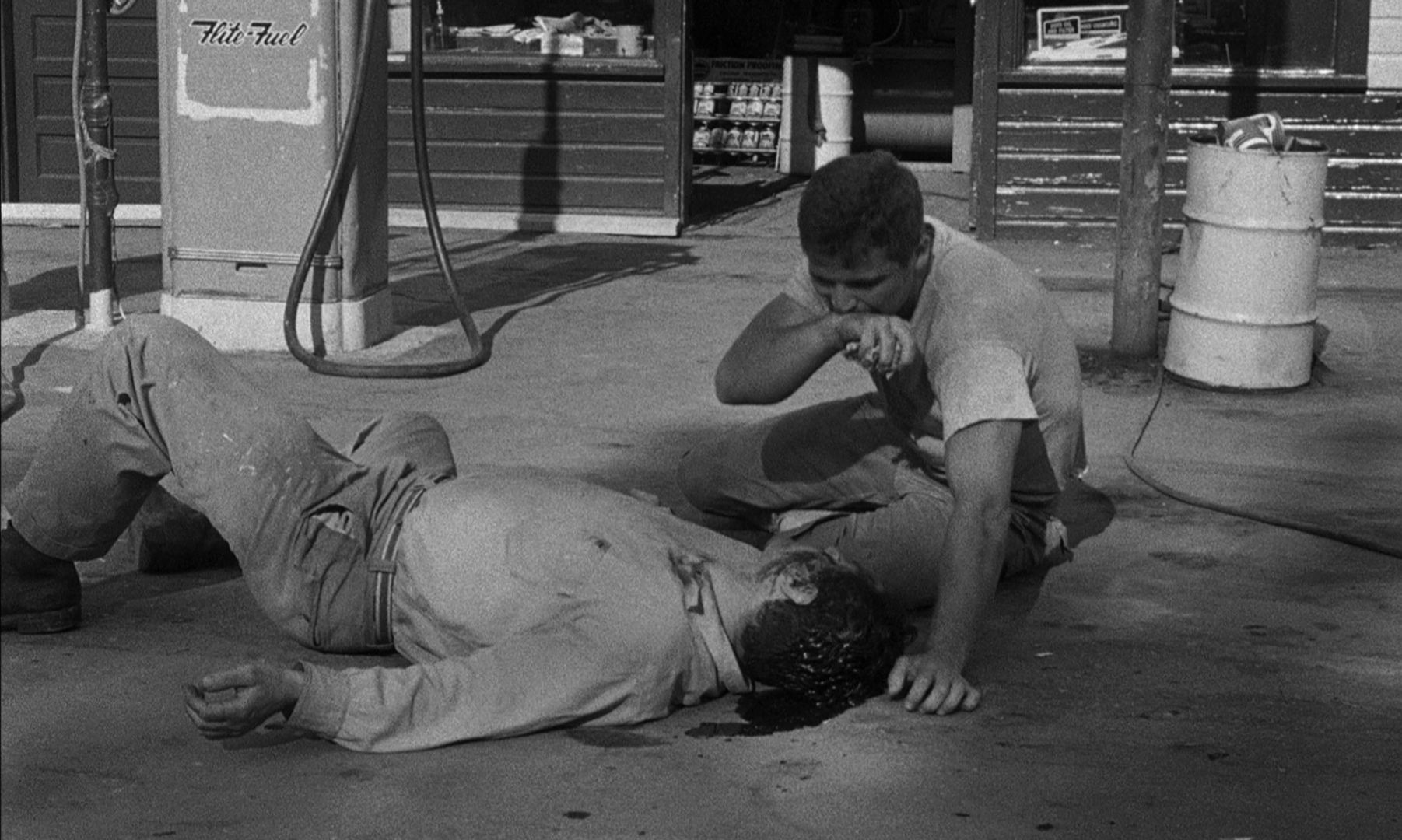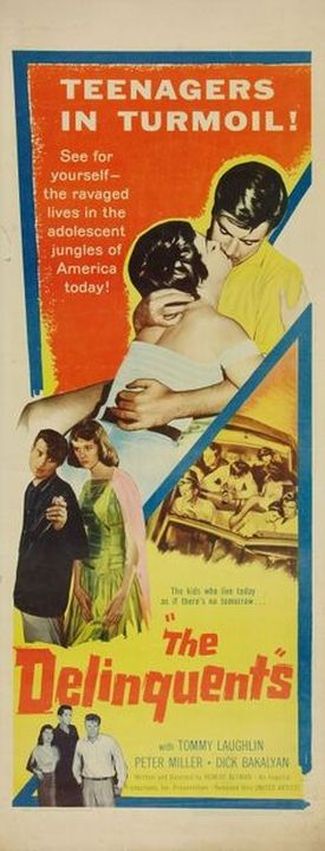 Scotty (Tom “Billy Jack” Laughlin) is having a bad day. First his mother (Lotus Corelli) is worrying too much about some local hoodlums messing with him, and tries to prevent him from going out on a date with his girlfriend Janice (Rosemary Howard). When he finally gets to Janice’s house, he’s met by her parents, including her irate father, who thinks she’s too young for Scotty’s intentions and forbids them from seeing each other anymore. Dejected, Scotty goes to a local drive-in, where those local hoodlums, lead by the 18-going-on-40 Cholly (Peter Miller), slash the tires on a rival gang’s car but make it look like Scotty did it. Jumped by a bunch of angry guys, Scotty holds his own, taking out his bad day on the face of one poor chump. Cholly senses Scotty would be good for some shenanigans, though his sidekick Eddy (Richard Bakalyan) doesn’t like the do-gooder Scotty, and makes this well known. Soon Cholly has concocted a nasty scheme that he says will bring Scotty and Janice back together, but which is really meant to harass Scotty, just for fun.
Scotty (Tom “Billy Jack” Laughlin) is having a bad day. First his mother (Lotus Corelli) is worrying too much about some local hoodlums messing with him, and tries to prevent him from going out on a date with his girlfriend Janice (Rosemary Howard). When he finally gets to Janice’s house, he’s met by her parents, including her irate father, who thinks she’s too young for Scotty’s intentions and forbids them from seeing each other anymore. Dejected, Scotty goes to a local drive-in, where those local hoodlums, lead by the 18-going-on-40 Cholly (Peter Miller), slash the tires on a rival gang’s car but make it look like Scotty did it. Jumped by a bunch of angry guys, Scotty holds his own, taking out his bad day on the face of one poor chump. Cholly senses Scotty would be good for some shenanigans, though his sidekick Eddy (Richard Bakalyan) doesn’t like the do-gooder Scotty, and makes this well known. Soon Cholly has concocted a nasty scheme that he says will bring Scotty and Janice back together, but which is really meant to harass Scotty, just for fun.
Written and directed by Robert Altman, who up until then had only directed corporate and educational films in his home town of Kansas City, The Delinquents was the brainchild of a local businessman looking to create drive-in movie fodder for his own theaters. What sets The Delinquents apart from other low-budget teen flicks of the time is its professional look. It’s clean, even sleek, and without the (usually hilarious) errors one would find in something meant to basically be background noise while teenagers necked in the back seat.
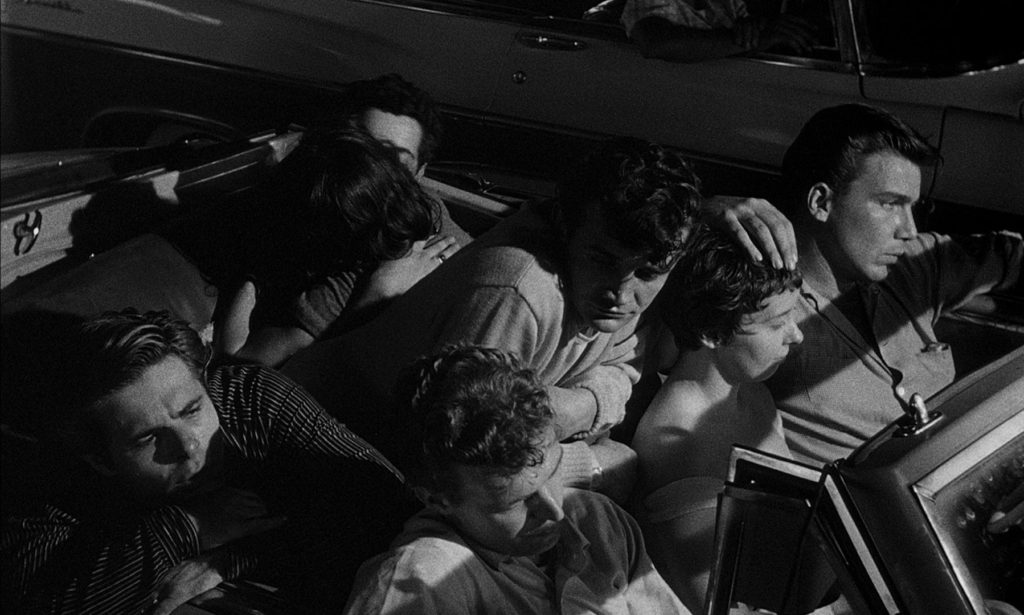
Though The Delinquents was the kind of exploitation flick marketed to kids at drive-ins, the film opens with the standard narrative voiceover that claims the intended audience is really adults, specifically parents, who need to be educated on the confusing new world their children are living in. And instead of that being just lip service, the film’s opening scenes are at a jazz club, the kind of place where adults go to relax and wind down, a place that the delinquents in question invade. They hassle the adults and wreck the place, and it makes the adults watching — well, if any ever did watch — immediately invested. “Great googly moogly, Martha, what if kids interrupt my evening of cocktails at a third-rate jazz club? Clearly, this is of great sociocultural concern.”
The film goes even further by refusing to paint the parents as one-dimensional monsters like so many other teen movies did at the time. Instead, they’re all trying to do the right thing, but they’re misguided and maybe old-fashioned. Janice’s dad for instance is concerned because his 16-year-old daughter is already talking about having kids with her boyfriend, and he thinks she needs to see other people while she’s young. He also doesn’t think Scotty is as interested in her as he should be, and Scotty proves him right by believing Janice is 17, even after he’s been corrected.
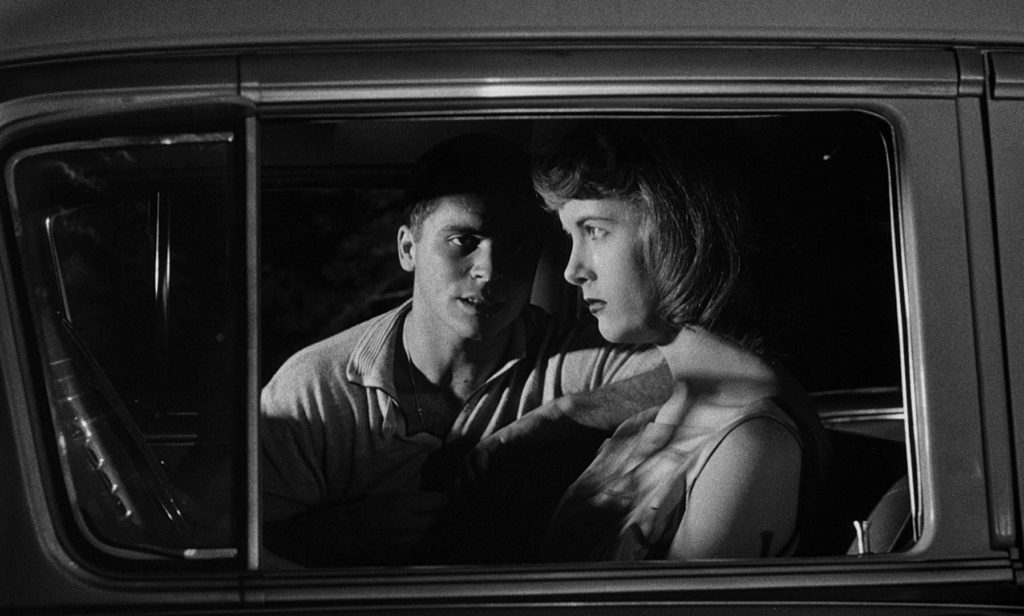
Scotty’s parents are somewhat better, though still flawed. His mother, played by Altman’s then-wife Lotus Corelli, is concerned that the bad kids in the neighborhood would influence her son, but her husband doesn’t care about anything except that she’s talking so loud he can’t hear the TV. Lotus didn’t do much acting but she does well in her role. She was pregnant during filming of The Delinquents, and had to endure the fun of her husband sleeping with another actress, Helen Hawley, who played Janice’s mother. Lotus’s and Robert’s son was born in 1955, and Altman clearly had no idea how to raise him, even though this wasn’t his first child; his daughter Christine, about 8 years old at the time, plays Scotty’s sister.
Lotus relates a story in Robert Altman: The Oral Biography about a time when she came home from work to find their toddler with his head stuck between the bars of the crib, and Altman laying on the couch, doing nothing, apparently clueless as to why this would even be a problem. Scotty’s parents in The Delinquents are basically a version of Lotus and Robert, intentionally or not: the dad is a chubby, lazy man who doesn’t want to parent, and the mother, well-meaning but overly concerned, is played by Lotus.
Rosemary Howard as Janice gives a performance that most people find irritating, though I thought she was quite good for an amateur in a film directed by, well, another amateur. She looks at the camera too much, and there are a couple of what look to be pick-up shots (would a film with such a low budget even have pick-up shots?) where she’s completely zoned out and useless, but otherwise, she’s solid as a girl not even close to being mature enough to handle the situation Scotty has put her in. Howard must have been one of the locals that Altman hired for the film, but there is just nothing about her online anywhere; she did The Delinquents and that was it, save some modeling, which I assume was local to her home state of Missouri and not national. (My own mother modeled in Missouri during the same time frame, which is one of the reasons I wish I could find out more about Howard.)
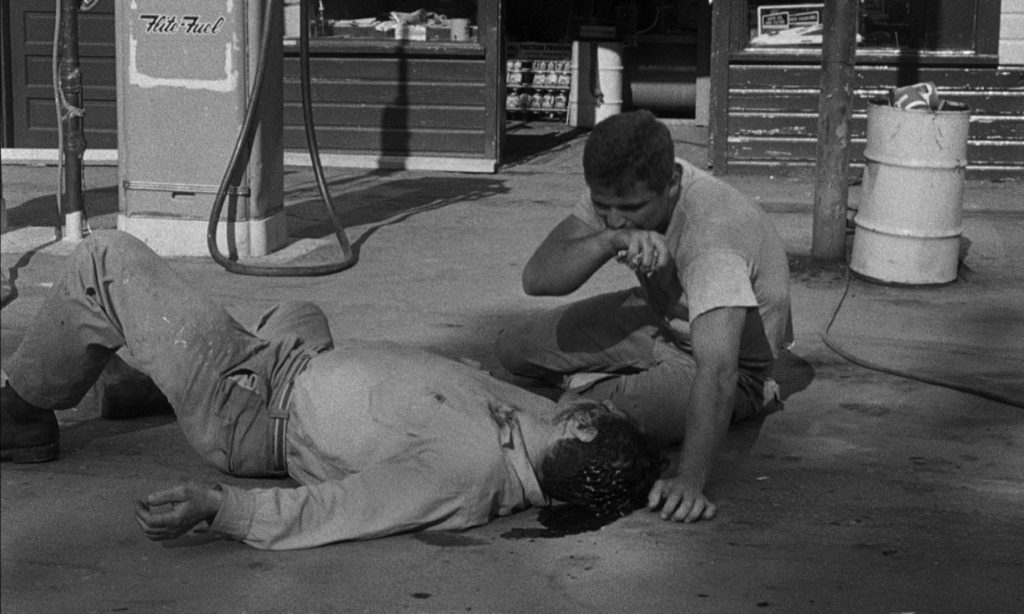
Other actors came from the Calvin Company, a Kansas City production studio that Altman worked at off and on for years. The three leads, however, came from California after Altman made a scouting trip looking for actors, and he managed to score some pretty experienced guys, considering the low budget. Laughlin and Miller had been in Tea and Sympathy as well as several television shows, though Miller also appeared in The Blackboard Jungle, Forbidden Planet and Rebel Without a Cause. Bakalyan had fewer roles before being cast in Delinquents, but he made quite a career for himself playing a rough kid; his next film would be Jerry Lewis’s The Delicate Delinquent. And it’s surprising how many people confuse promotional photos for The Delicate Delinquent with this film — even this Kansas City magazine article about KCMO locations used in movies uses a picture with Jerry Lewis in it, instead of a picture from The Delinquents!
Speaking of filming locations, Kansas City locals will recognize several sites used in the film. It opens in a local jazz club, the name of which I haven’t been able to find, but which featured well-known Missouri jazz singer Julia Lee. The now-demolished Crest Drive-In movie theater plays a big role, as does the police station on Locust Street (still there in all its boxy 1930s art deco glory), the rose garden in Loose Park, and Allen’s Drive-In, though don’t ask me which location it was.
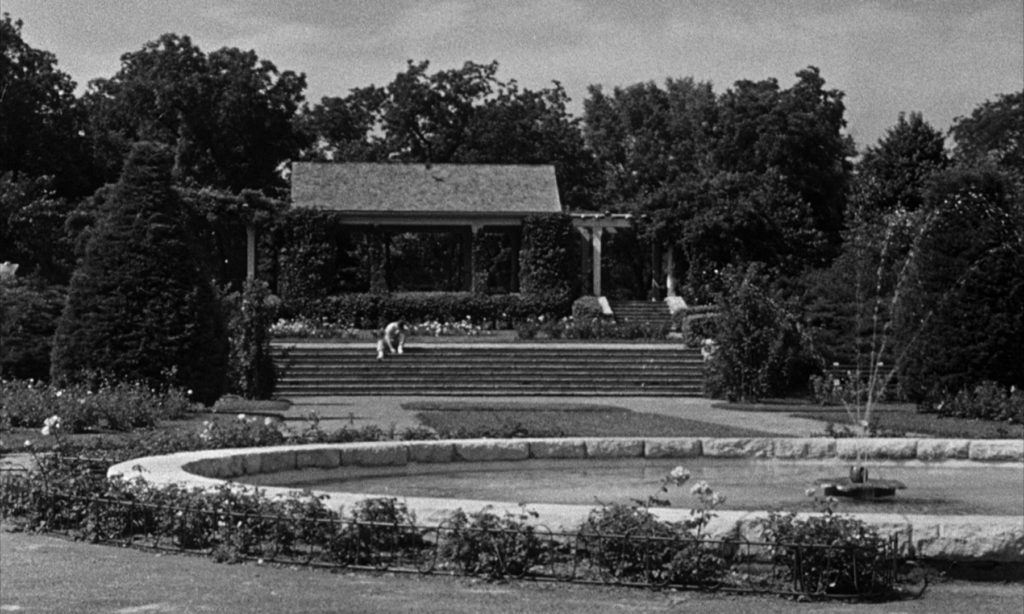
Unlike other exploitation flicks which prefer to barrel through the plot at lightning speed, The Delinquents allows for some development of character. Cholly spends a good chunk of time coming up with new ideas on how to screw with people. There’s awkward conversation as the scheme forms, lingering shots as he sizes Scotty up, and his sidekick Eddy doing the same but to a lesser and less refined degree. It’s all about testing boundaries, learning to navigate in a world where there aren’t many goals or options, struggling against conformity and boredom, untrusting of actual happiness to the point of destroying it for fun, while remaining enthralled with artificial happiness, i.e. lots of drinking and sex and freedom. But, as Brak always said, fetishizing the meaninglessness of life is little more than rebelling against your own free will: “There are no absolutes, thus you perceive our world as meaningless, when it’s really your own freedom you detest.”
Olive Films has released The Delinquents for the first time on Blu-ray in a gorgeous print. It’s pretty bare-bones, but has good subtitles along with good audio. This is a film that cries out for a commentary track, and the lack of one is the only nit I would dare to pick about this release.

